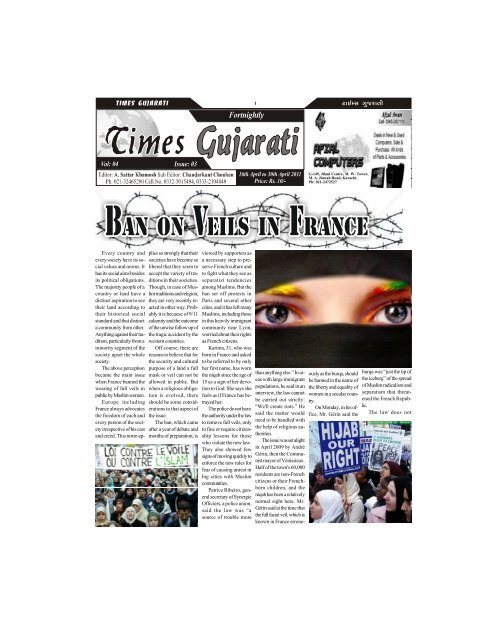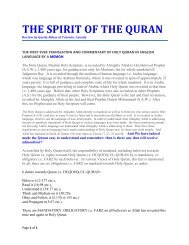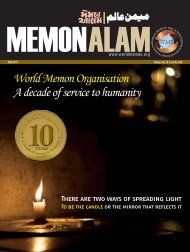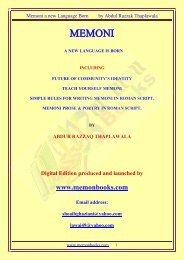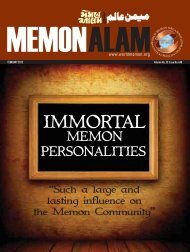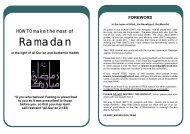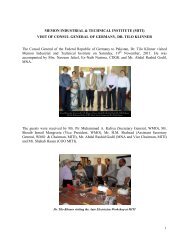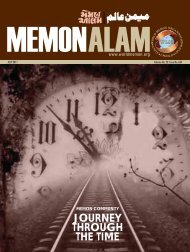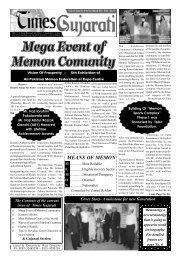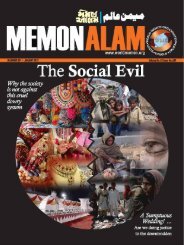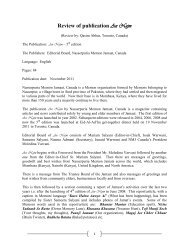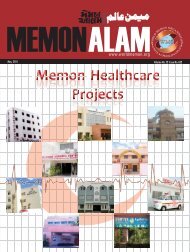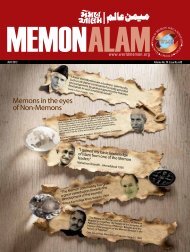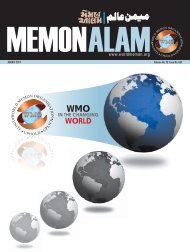D:\New Folder\Times Gujarati\20 - Memon Point
D:\New Folder\Times Gujarati\20 - Memon Point
D:\New Folder\Times Gujarati\20 - Memon Point
Create successful ePaper yourself
Turn your PDF publications into a flip-book with our unique Google optimized e-Paper software.
Times Gujarati<br />
1<br />
8f?D; u]hzftl<br />
G-149, Jilani Centre, M. W. Tower,<br />
M. A. Jinnah Road, Karachi.<br />
Ph: 021-2472527<br />
Every country and<br />
every society have its social<br />
values and norms. It<br />
has its social aims besides<br />
its political obligations.<br />
The majority people of a<br />
country or land have a<br />
distinct aspiration to see<br />
their land according to<br />
their historical social<br />
standard and that distinct<br />
a community from other.<br />
Anything against their tradition,<br />
particularly from a<br />
minority segment of the<br />
society upset the whole<br />
society.<br />
The above perception<br />
became the main issue<br />
when France banned the<br />
wearing of full veils in<br />
public by Muslim women.<br />
Europe including<br />
France always advocates<br />
the freedom of each and<br />
every person of the society<br />
irrespective of his cast<br />
and creed. This norm applies<br />
so strongly that their<br />
societies have become so<br />
liberal that they seem to<br />
accept the variety of traditions<br />
in their societies.<br />
Though, in case of Muslim<br />
traditions and religion,<br />
they are very recently reacted<br />
in other way. Probably<br />
it is because of 9/11<br />
calamity and the outcome<br />
of the unwise follow up of<br />
the tragic accident by the<br />
western countries.<br />
Off course, there are<br />
reasons to believe that for<br />
the security and cultural<br />
purpose of a land a full<br />
mask or veil can not be<br />
allowed in public. But<br />
when a religious obligation<br />
is evolved, there<br />
should be some considerations<br />
to that aspect of<br />
the issue.<br />
The ban, which came<br />
after a year of debate and<br />
months of preparation, is<br />
viewed by supporters as<br />
a necessary step to preserve<br />
French culture and<br />
to fight what they see as<br />
separatist tendencies<br />
among Muslims. But the<br />
ban set off protests in<br />
Paris and several other<br />
cities, and it has left many<br />
Muslims, including those<br />
in this heavily immigrant<br />
community near Lyon,<br />
worried about their rights<br />
as French citizens.<br />
Karima, 31, who was<br />
born in France and asked<br />
to be referred to by only<br />
her first name, has worn<br />
the niqab since the age of<br />
15 as a sign of her devotion<br />
to God. She says she<br />
feels as if France has betrayed<br />
her.<br />
The police do not have<br />
the authority under the law<br />
to remove full veils, only<br />
to fine or require citizenship<br />
lessons for those<br />
who violate the new law.<br />
They also showed few<br />
signs of moving quickly to<br />
enforce the new rules for<br />
fear of causing unrest in<br />
big cities with Muslim<br />
communities.<br />
Patrice Ribeiro, general<br />
secretary of Synergie<br />
Officiers, a police union,<br />
said the law was “a<br />
source of trouble more<br />
than anything else.” In areas<br />
with large immigrant<br />
populations, he said in an<br />
interview, the law cannot<br />
be carried out strictly:<br />
“We'll create riots.” He<br />
said the matter would<br />
need to be handled with<br />
the help of religious authorities.<br />
The issue was set alight<br />
in April 2009 by André<br />
Gérin, then the Communist<br />
mayor of Vénissieux.<br />
Half of the town's 60,000<br />
residents are non-French<br />
citizens or their Frenchborn<br />
children, and the<br />
niqab has been a relatively<br />
normal sight here. Mr.<br />
Gérin said at the time that<br />
the full facial veil, which is<br />
known in France erroneously<br />
as the burqa, should<br />
be banned in the name of<br />
the liberty and equality of<br />
women in a secular country.<br />
On Monday, in his office,<br />
Mr. Gérin said the<br />
burqa was “just the tip of<br />
the iceberg” of the spread<br />
of Muslim radicalism and<br />
separatism that threatened<br />
the French Republic.<br />
The law does not
Times Gujarati<br />
mention Islam or women.<br />
It bans the covering of the<br />
face in any public place,<br />
including shops and the<br />
street, as a security measure.<br />
A clause says that<br />
anyone who forces a<br />
woman to cover her face<br />
can be imprisoned for up<br />
to a year and fined up to<br />
30,000 euros, about<br />
$43,000.<br />
But the law is “a point<br />
of departure,” said Mr.<br />
Gérin, who retired as<br />
mayor but remains a<br />
member of the National<br />
Assembly. Speaking of<br />
young Muslim women<br />
who refuse to participate<br />
in school sports, or Muslim<br />
men who refuse to allow<br />
a male doctor to treat<br />
their wives or who allegedly<br />
compel their wives to<br />
wear the veil, Mr. Gérin<br />
called the law “a wakeup<br />
call,” a means “to<br />
eradicate this minority of<br />
fundamentalists, 'the gurus'<br />
who instrumentalize<br />
Islam for political reasons.”<br />
The observation made<br />
by Mr.Gerin can not be<br />
accepted by Muslim<br />
Ummah. Many Muslim<br />
women in France say it<br />
feels like an outrage. To<br />
them, it singles out and<br />
stigmatizes one gender of<br />
one religion.<br />
2<br />
Karima, who runs a<br />
business and uses public<br />
transportation, said she<br />
would lift the veil if required<br />
for an identity<br />
check, but added, “I<br />
won't remove it, I'll have<br />
to be buried in it.”<br />
She cannot sleep with<br />
worry, she said. “From<br />
now on, I'll be treated like<br />
an illegal worker, an outlaw,<br />
a person wanted by<br />
the police, even though the<br />
only crime I've committed<br />
is to show myself as I<br />
am.”<br />
Nelly Moussaid, 28, a<br />
former national karate<br />
champion, has been wearing<br />
the niqab for two<br />
years “as a sign of faith.”<br />
She lives in Marseille with<br />
her husband and their 4-<br />
month-old boy. The mood<br />
in France is aggressive,<br />
she said. “Before, on the<br />
street, I got only stares.<br />
But now people look at<br />
us as if we had killed their<br />
mothers.”<br />
The Interior Ministry<br />
estimates that only about<br />
2,000 women wear the<br />
niqab in France, while Mr.<br />
Gérin, who helped write<br />
a long parliamentary report<br />
on the issue, believes<br />
that the number is higher.<br />
But with an estimated six<br />
million Muslims in France,<br />
the action taken seems<br />
large compared with the<br />
problem, critics say, and<br />
they accuse President<br />
Nicolas Sarkozy and his<br />
center-right party of playing<br />
politics with a generalized<br />
and unjustified fear<br />
of Islam and immigrants.<br />
Mr. Sarkozy has responded<br />
that Islam is not<br />
the problem, only radical<br />
Islam, which does not respect<br />
French values and<br />
separation of church and<br />
state.<br />
Naima Bouteldja interviewed<br />
32 women<br />
who wear the niqab for<br />
8f?D; u]hzftl<br />
the Open Society Foundation,<br />
a<br />
nongovernmental organization.<br />
She found none<br />
who said they had been<br />
forced to wear the veil,<br />
and they started wearing<br />
the niqab as a response to<br />
the political controversy.<br />
Eight of the 32 were<br />
French converts to Islam;<br />
a third said they did not<br />
wear the niqab all the time.<br />
“Some were angry,<br />
and some said that many<br />
'niqabis' had already left<br />
France, and many of them<br />
talked about leaving<br />
France,” she said. “Most<br />
of the women confront<br />
verbal abuse on a daily<br />
basis, with a lot of the<br />
abuse coming from Muslims.”<br />
These all developments<br />
in France after the<br />
ban on veil lead to widen<br />
the gap between Europe<br />
and Muslim Societies in<br />
the world and that should<br />
be avoided for better global<br />
world relations among<br />
the different societies.
Times Gujarati<br />
3<br />
8f?D; u]hzftl<br />
UK MILKMAN<br />
LEARNS GUJARATI<br />
Cemcho<br />
bhai, sara choni?<br />
That is<br />
Gujarati for: “Hello<br />
brother, how are you?<br />
These words are<br />
spoken by English-born<br />
milkman.<br />
John (Jimmy)<br />
Mather, who has been<br />
delivering milk to<br />
Gujarati households in<br />
Blackburn for over 40<br />
years. has been doing<br />
the rounds in this northwest<br />
town for the past<br />
50 years. And in this 40<br />
years he has become<br />
nearly fluent in Gujarati!<br />
“When I first<br />
started the rounds here<br />
there were only a handful<br />
of Asian families,<br />
about eight or 10, in the<br />
London Road, Whalley<br />
St and Altom St areas of<br />
Blackburn,” Jimmy told<br />
Rahila Bano, a BBC reporter.<br />
But as more arrived<br />
on the foreign<br />
shores from Kenya and<br />
Malawi, Jimmy's ability<br />
to go beyond delivering<br />
just milk - and procure<br />
the sorts of foods they<br />
couldn't pick up in the local<br />
supermarket - put<br />
him in greater demand.<br />
“They wanted<br />
natural yoghurt, ghee,<br />
goats and chickens, the<br />
type of things they were<br />
used to back home. I'd<br />
gone to the dairies here<br />
and they said that there<br />
wasn't the demand, but<br />
they couldn't have been<br />
more wrong.”<br />
Endearing<br />
“In the end, I<br />
went to Leicester, where<br />
there was a large Asian<br />
community and then to<br />
Birmingham, to get what<br />
they needed.”<br />
But Jimmy quickly<br />
came up against a language<br />
barrier. The new<br />
immigrants struggled to<br />
understand him and vice<br />
versa.<br />
“But we got<br />
through it. Somehow we<br />
managed and I learnt<br />
their language.”<br />
Jimmy under<br />
plays the challenge of<br />
learning this foreign<br />
tongue.<br />
The structure of<br />
the language is different<br />
from English, says Professor<br />
Rachel Dwyer, an<br />
expert in Indian cultures<br />
at the School for African<br />
and Oriental Studies in<br />
London.<br />
“It's subject, object,<br />
verb - the girl - the<br />
book - reads,” she says.<br />
Add to that a host<br />
of different vowel<br />
sounds.<br />
“The vowels<br />
would be more familiar<br />
to a non-English European<br />
speaker as English<br />
vowels are rarely pure.<br />
Gujarati vowels also feature<br />
'murmur'. There is a<br />
series of retroflex consonants,”<br />
she says, referring<br />
to sounds that<br />
are made with the tongue<br />
tip turned up or curled<br />
back just under the hard<br />
palate.<br />
Gujarati also uses<br />
contrasting aspirated<br />
consonants - those<br />
which start with a strong<br />
burst of air - and<br />
unaspirated consonants,<br />
she notes.<br />
But for Jimmy it<br />
was easy!<br />
“It was not very<br />
difficult to learn it,” he<br />
says. “I just remembered<br />
what they told me, kept<br />
it in my memory and repeated<br />
it when I saw<br />
them. I don't know how<br />
long it took me to learn.<br />
I've known the language<br />
for about 30 years and<br />
once you pick up words<br />
you remember them.<br />
“I've got a very<br />
good memory, once I've<br />
been somewhere I never<br />
forget it, it's the same<br />
with language.”<br />
His ability to cater<br />
for the needs of the<br />
Muslim-Gujarati community<br />
in Blackburn and<br />
speak their native tongue<br />
has endeared him to<br />
many of the locals.<br />
One of his acquaintances,<br />
Saeed<br />
Adam, is nothing short<br />
of impressed with<br />
Jimmy's aptitude.<br />
“He's impressed<br />
me with the language.<br />
He learnt it from the first<br />
generation, which is our<br />
parents, back in the<br />
1960s when he was<br />
serving the community.<br />
“It's absolutely<br />
brilliant and just great<br />
that a white English person<br />
can speak it. All the<br />
locals love him.”<br />
During three years<br />
Jimmy has made many<br />
friends with Gujaratis<br />
from Blackburn and believes<br />
that learning about<br />
each other's culture is<br />
the way forward.This is<br />
in sharp contrast to<br />
David Cameron's view<br />
that Multi culturalism in<br />
the UK has failed.<br />
GUJARATI CONNECTION<br />
TO THE ROYAL WEDDING CAKE<br />
There was a Gujarati connection to the Royal wedding<br />
cake. Prince William and Kate Middleton<br />
chose a cake company run by a Gujarati in<br />
Leicestershire. Baker Fiona Cairns, who is married<br />
to Kishore Patel, made the wedding cake.<br />
Cairns was commissioned to create a traditional<br />
multi-layered fruit cake with a floral design for the<br />
royal wedding along with a second one made from<br />
rich tea biscuits.<br />
Fiona Cairns Ltd began on Fiona’s kitchen table 25<br />
years ago, when Patel - now managing director of<br />
the company - spotted the potential of his wife’s<br />
beautifully crafted handmade cakes. In 2001,<br />
Kishore joined the company.<br />
After the wedding Cairns told the BBC that the<br />
cake went “beyond the expectations of the newlymarried<br />
couple.<br />
PARESH RAWAL<br />
ON UK TOUR<br />
Renowned<br />
Bollywood actor,<br />
Paresh Rawal is in<br />
the UK as part of<br />
his sellout show.<br />
The play has already<br />
been a huge<br />
sellout in USA, 51 sold out shows in 53 days.<br />
Now, he will be touring UK performing for what the<br />
critics are calling, A hilariously entertaining and sensationally<br />
shocking Hindi play “Krishan vs Kanhaiya”.<br />
It is a story of an atheist who incurs huge losses when<br />
his antique shop is destroyed by an earthquake. The<br />
story revolves around the fight of the atheist with the<br />
Almighty.<br />
Along with Paresh Rawal is his team of talented TV<br />
and stage artists including Dharmender Gohil, Sirdhar<br />
Vatsar, Vaibhav Biniwala, Khusboo Brhmbhatt, Chirag<br />
Vora, Ankit and others.<br />
He will be performing 10 shows in 3 cities , London,<br />
Leicester and Birmingham.
Times Gujarati<br />
4<br />
For You and Me,<br />
Creator is the same<br />
8f?D; u]hzftl<br />
A LIFE FULL OF CHALLENGES AND ACHIEVEMENTS.<br />
HE DEFEATED HIS DISABILITY.<br />
Raza-Ul-Jabbar<br />
needs no introduction. He<br />
distinguished, recognized<br />
and respectable personality<br />
of the community. He<br />
was a community leader<br />
and his contributions and<br />
achievements were tremendous.<br />
He had a life full of<br />
challenges and like a<br />
brave warrior he fought<br />
against his disabilities for<br />
the whole life. For 25<br />
years he worked in accounting<br />
and legal areas<br />
with Revenue Canada,<br />
Taxation (11 years), Ontario<br />
Ministry of Health<br />
and Ontario Ministry of<br />
Consumers & Commercial<br />
Relations (7 years),<br />
Harbour front Computer<br />
Center (One year) and<br />
with chartered accountant<br />
firms (18 months).<br />
Jabbar had a brilliant<br />
literary background. He<br />
was an author of seven<br />
published books in Urdu<br />
and Hindi and earned laurels<br />
and many literary<br />
awards for his outstanding<br />
contributions to literature.<br />
His books are<br />
Hadees-e-Deccan , Nau<br />
Heerey (1958), Roshni<br />
Ki Kiran (1970), Nai<br />
Dharkan (1975), Chand<br />
Ki Kashti Ka Akela<br />
Musafir (1985), Sunkh<br />
Uthaney Ka Hosla<br />
(1991) and 7. Saharon<br />
Ke Mausam (2006).<br />
Socially he was very<br />
active. He was Moderator,<br />
speaker and Integrated<br />
Member of the<br />
Christian-Muslim Forum<br />
of Canada. He launched<br />
project, “Feelings on<br />
Wheels”, formed to raise<br />
awareness of ability and<br />
empowerment of individuals<br />
with special<br />
needs.<br />
Razaul Jabbar was<br />
born on March 10, 1937,<br />
in Hyderabad Deccan,<br />
India. When he was about<br />
one year old, he became<br />
a victim of Infantile Paralysis.<br />
His legs and hands<br />
were completely<br />
paralyzed. His neck and<br />
back too were partly affected.<br />
Later, some<br />
strength returned to hands<br />
but legs remained<br />
paralyzed.<br />
Due to lack of facilities<br />
70 years back,<br />
Jabbar faced very tough<br />
time. There was no rehabilitation;<br />
no wheelchairs<br />
and the school and office<br />
buildings were not accessible.<br />
He could only move<br />
by sitting on the floor and<br />
dragging his body with<br />
the help of his hands. As<br />
a result, his lower body's<br />
skin was affected with<br />
eczema and bruises. During<br />
winter, it became more<br />
difficult. Dragging on the<br />
cold floor resulted in attacks<br />
of cold and fever.<br />
His ears were affected<br />
and there was continuous<br />
discharge from them.<br />
Razaul Jabbar's disability<br />
became a great<br />
challenge for him. People<br />
used to taunt, harass and<br />
discourage him. The family<br />
and society considered<br />
him a burden. The barriers<br />
of attitude gave hard<br />
times. He, however, faced<br />
the time and situation very<br />
bravely. He started going<br />
to school from Class 6th.<br />
Before that he used to<br />
study at home. He used<br />
to read stories about children<br />
and this interest developed<br />
into an urge to<br />
write short stories.<br />
In 1954, he remained<br />
in the hospital for<br />
14 months due to major<br />
surgery---from toe to<br />
chest. Even in this condition,<br />
he used to read<br />
books. In the hospital, he<br />
wrote three stories, which<br />
were selected and published<br />
in a reputed weekly<br />
Urdu journal 'Rahbar',<br />
published from Bombay.<br />
In 1960, when<br />
Razaul Jabbar was a student<br />
of M. Com, he was<br />
editor of Osmania Journal,<br />
published by<br />
Osmania University,<br />
Hyderabad Deccan. He<br />
did both B.Com and<br />
M.Com from Osmania<br />
University.<br />
Razaul Jabbar married<br />
in 1967. His wife,<br />
Zarina Rangwala, belonged<br />
to the Dawoodi<br />
Bohra community. She<br />
was his fan and this ended<br />
in a dramatic love marriage.<br />
Because of his disability,<br />
the Bohri community<br />
gave him a very tough<br />
time and opposed him<br />
tooth and nail. Zarina is a<br />
highly educated lady and<br />
has MA and B.Ed degrees.<br />
Before migrating to<br />
Canada, Razaul Jabbar<br />
was Accounts Officer in<br />
a shipping firm. He served<br />
the firm for ten years. At<br />
the same time, he used to<br />
teach part time in Burhani<br />
College of Commerce,<br />
Mumbai as a part-time<br />
professor for seven years.<br />
While in Mumbai<br />
Jabbar attended an international<br />
conference for<br />
disabled in Winnipeg,<br />
Manitoba (Canada). He<br />
liked the place very much<br />
and decided to settle in<br />
Canada. He filed his immigration<br />
papers in New<br />
York, USA, and returned<br />
to India. He migrated to<br />
Canada in 1980. Zarina<br />
came to Canada one year<br />
later.<br />
From 1980-1986,<br />
he did small contract jobs<br />
and then onwards served<br />
the provincial and federal<br />
governments. He found<br />
Canada a very good<br />
country and says people<br />
here have feelings for<br />
each other. They are educated,<br />
sensible and civilized.<br />
Jabbar said:<br />
“Canada is a very nice<br />
country and has given me<br />
a lot. I can only dream of<br />
For you and me, Creator is the same ,<br />
We only call Him by different name.<br />
To this world He has sent us from above,<br />
To live with each other in peace and love.<br />
Be we white or black, brown or in-between,<br />
Heavy or light, tall or short, fat or lean.<br />
The Universe has always been,<br />
To all of us, a common scene.<br />
Day light, fresh air, greenery or moonlight,<br />
Give equal pleasure to every sight.<br />
For all, the Sun shines just as bright<br />
And stars twinkle every night.<br />
The power that controls our soul and mind,<br />
Is surely not of different kind.<br />
Look at children, and you will find,<br />
That link, that all of us does bind.<br />
All we can do is pray,<br />
May we soon see that day.<br />
When peace to our troubled world will come,<br />
And man be united in God’s Kingdom.<br />
Mohammed Hussain Zoomkawala<br />
the facilities else where.<br />
Here I have a custommade<br />
car with arrangement<br />
to lift wheelchair. It<br />
is automated and handcontrolled.<br />
I drove the car<br />
from Toronto to Washington<br />
in 2004 and went<br />
to New York in 2003 to<br />
attend a marriage. I keep<br />
driving from Toronto to<br />
Ottawa. Where else can<br />
we get so much facilities,<br />
support and care?”<br />
He said: “I never<br />
complained about<br />
Canada and never faced<br />
problems of racism or discrimination.<br />
Instead, a<br />
disabled Jew girl saw me<br />
standing outside the immigration<br />
office in New<br />
York when she was going<br />
inside the office. When<br />
she came back she saw<br />
me still standing there.<br />
She asked me what was<br />
the problem and I told her<br />
that my calliper had broken<br />
and I need to go by<br />
bus but I can hardly move.<br />
I don't have the taxi fare<br />
so I can't go home. She<br />
took me in a taxi to a<br />
shop and got the calliper<br />
repaired. This was how I<br />
reached home. She was<br />
a complete stranger and<br />
disabled but helped me<br />
greatly.”<br />
“In the Osmania University,<br />
Hyderabad<br />
Deccan, too Hindu students<br />
used to regularly<br />
help me climb the stairs.<br />
They used to lift me up,”<br />
he stated.<br />
Jabbar said: “There<br />
is a code of conduct for<br />
Muslims in the Holy<br />
Quran and they should<br />
follow it strictly.”<br />
Razaul Jabbar has<br />
two children---a son and<br />
a daughter---and five<br />
grandchildren. His son,<br />
Khaliq Raza Jabbar is and<br />
is a graduate in medical<br />
rehabilitation. Khaliq and<br />
his wife Asma have 3 children.<br />
His daughter,<br />
Shehna, is working on her<br />
Cont. to Page No. 05
Times Gujarati<br />
The Editor<br />
Times Gujarati<br />
Thanks a lot for<br />
sending 'Times Gujarati.' I<br />
read it from page to page<br />
and enjoyed it.<br />
First of all on behalf<br />
of myself and all my family<br />
members I congratulate<br />
Jawwad Iqbal Gaba and<br />
his family for setting a new<br />
world record. Yes, we<br />
Musalmans are capable of<br />
doing any good thing in this<br />
world. May Allah (swt)<br />
give this young man more<br />
courage to do something<br />
more in his life. He has<br />
done a pride not only to<br />
him but for the entire<br />
Umma. With your permission<br />
I am sending this report<br />
to some Gujarati and<br />
Urdu newspapers in<br />
Mumbai.<br />
The report about<br />
Mohtaram Sydena Mohd.<br />
Burhanuddin sahab is<br />
good. Here in Canada also<br />
Bohara community took<br />
out rally in celebration. I<br />
am sending 'Times<br />
Guajarati' to my one or two<br />
Bohra friends and I am<br />
sure they will be happy to<br />
read and circulate among<br />
their contacts.<br />
Enjoyed thoroughly<br />
the photos and report of<br />
launching ceremony of<br />
'Times Gujarati.' I am<br />
happy to read the report of<br />
the activities of Senior Citizens<br />
Forum in 'Social<br />
Round up.' I was particularly<br />
delighted to see some<br />
youth in it. I always say<br />
that velour of the youth and<br />
wisdom of seniors are<br />
joined together no one in<br />
the world can stop Umma<br />
to achieve anything.<br />
Last year here in<br />
Canada I formed a group<br />
of Seniors named<br />
'Hamara Sahara.' We take<br />
them for picnic for the<br />
whole day, organise get<br />
togathers, invite some<br />
writers and poets of<br />
Gujarati, Urdu and Hindi to<br />
read their stories and<br />
poetries. We meet in a<br />
community centre every<br />
Saturday. Marhum Raza-<br />
Ul-Jabbar was one of<br />
them. We also provide<br />
them refreshments.<br />
Rcently we took 20 of<br />
them to see Ontario Science<br />
Centre. Inshallah I'll<br />
send you report and photos<br />
shortly. I lead them.<br />
Inshallah, I'll be sending<br />
you community reports<br />
from Toronto and around.<br />
Regards.<br />
Firoz Khan<br />
Sr. Editor,<br />
Hindi Abroad<br />
Soft copy of<br />
weekly<br />
(www<br />
hindiabroad.com)<br />
Toronto, Canada<br />
Times Gujarati is avaliable on<br />
www.memonpoint.com<br />
5<br />
8f?D; u]hzftl<br />
THE WORLD<br />
BIGGEST FAMILY<br />
Indian man with 39 wives, 94 children and 33 grandchildren<br />
Believe it or not, a<br />
man in Mizoram has 39<br />
wives, 94 children and 33<br />
grandchildren all living together<br />
under one roof in<br />
a picturesque village<br />
about 100 km from<br />
Baktawng in the north of<br />
the state.<br />
A 66-year-old man<br />
in India’s remote northeast<br />
has 39 wives, 94 children<br />
and 33 grandchildren,<br />
all living under one<br />
roof<br />
They all live in a four<br />
storied building with 100<br />
rooms in a mountainous<br />
village in Mizoram state,<br />
sharing borders with<br />
Burma and Bangladesh,.<br />
Ziona Chana is head<br />
of the world’s biggest<br />
family - and says he is<br />
‘blessed’ to have his 39<br />
wives and 94 children and<br />
33 grandchildren<br />
His wives share a<br />
dormitory near Ziona’s<br />
private bedroom and locals<br />
said he likes to have<br />
seven or eight of them by<br />
his side at all times<br />
The wives take turns<br />
cooking, while his daughters<br />
clean the house and<br />
do washing. The men do<br />
outdoor jobs like farming<br />
and taking care of livestock<br />
He heads a local<br />
Christian religious sect,<br />
called the “Chana”, which<br />
allows polygamy. Formed<br />
in June 1942, the sect believes<br />
it will soon be ruling<br />
the world with Christ<br />
and has a membership of<br />
Cont. Page No. 04<br />
M. Ed. She is working as<br />
an administrator in the<br />
University of Toronto for<br />
more than ten years. His<br />
son-in-law Javed is a certified<br />
professional engineer<br />
and works in a reputed<br />
engineering firm.<br />
Despite disability<br />
and tough challenges,<br />
Razaul Jabbar managed<br />
to not only make a respectable<br />
place for himself<br />
in the society and system<br />
but helped his children<br />
as well in getting good<br />
education and jobs. He<br />
retired in 2002 and and<br />
since then kept himself<br />
busy in social, cultural and<br />
literary activities till his last<br />
days. There was hardly<br />
any function in and around<br />
Toronto where he was not<br />
present.<br />
Jabbar said that he<br />
sponsored his mother to<br />
Canada in 1983. She was<br />
90 and since then he<br />
looked after her with<br />
great care. He loved her<br />
very much.<br />
Razaul Jabbar too<br />
around 400 families<br />
They live in a 100-<br />
room, four storey house<br />
set amidst the hills of<br />
belonged to a literary family.<br />
His father, Abdul<br />
Jabbar, was in the teaching<br />
profession. Jabbar<br />
had the determination and<br />
will to fight, struggle and<br />
move forward. He had<br />
proved it and hoped to do<br />
more. He believed in<br />
practical achievement instead<br />
of verbal service.<br />
He believed that<br />
there are hundreds of<br />
people in the South Asian<br />
community who are genius,<br />
brilliant, talented,<br />
highly skilled and educated.<br />
All they need is<br />
proper encouragement,<br />
promotion and recognition.<br />
Unfortunately, their<br />
services remain unutilized.<br />
They are an asset and<br />
must not be rusted and<br />
wasted. This is a tremendous<br />
loss for Canada. An<br />
effective policy needs to<br />
be formulated to help<br />
them and fully benefit<br />
from their valuable services.<br />
This is essential for<br />
progress of Canada and<br />
prosperity of the people.<br />
Whether Pakistanis or Indians,<br />
South Asians must<br />
Baktwang village in the<br />
Indian state of Mizoram,<br />
where the wives sleep in<br />
giant communal dormitories.<br />
unite and work together.<br />
One day while conversing<br />
with him I asked,<br />
"Jabbar sahab, you wrote<br />
many stories. Tell me<br />
which is most dear to<br />
you?" He thought for a<br />
while and said, "Very difficult<br />
question. I am a<br />
writer and for me all my<br />
stories are dear. Like a<br />
father who loves equally<br />
all his children. Still, I'll<br />
answer. Yes, 'Gule Lala' is<br />
very dear to me.' He<br />
paused for some time as<br />
if lost in the past and continued,<br />
"You know Firoz,<br />
Lilly flower in Urdu is<br />
known as Gule Lala. This<br />
beautiful flower has a<br />
black patch and that<br />
patch gives more beauty<br />
to Lilly. My life is like Lilly<br />
and my disability is a<br />
black patch that gives<br />
beauty to my life."<br />
He was in receipt of<br />
many awards including<br />
Sahitya Academy Award<br />
of India and 'Jewel of The<br />
Community’ award given<br />
by Mehfil Group, a social<br />
and cultural organisation<br />
based at Toronto.<br />
Courtesy:<br />
Raza-Ul-Jabbar's<br />
family.
Times Gujarati<br />
No Indian community internalized<br />
the civilizing<br />
mission of the British as<br />
did the Parsis. Only<br />
50,000 remain in Bombay<br />
today, mainly in South<br />
Bombay, the most disciplined<br />
and cultured part of<br />
India .<br />
In South Bombay, the cutting<br />
of lanes by drivers is<br />
punished, jumping a red<br />
light is impossible, parking<br />
is possible only in allotted<br />
areas, roads are<br />
clean, service is efficient,<br />
the restaurants are unmatched<br />
- civilization<br />
seems within reach. South<br />
Bombay has some of the<br />
finest buildings in India,<br />
many of them built by<br />
Parsis.<br />
The Parsis came to Bombay<br />
after Surat 's port<br />
silted over in the 17th century.<br />
Gerald Aungier settled<br />
Bombay and gave<br />
Parsis land for their<br />
Tower of Silence on<br />
Malabar Hill in 1672. The<br />
Parsis made millions<br />
through the early and<br />
mid-1800s and they spent<br />
much of it on public good.<br />
The Ambanis built<br />
Dhirubhai Ambani International<br />
School , where<br />
fees are Rs. 348,000 (US<br />
$8,000 a year in a country<br />
where per capita income<br />
is $ 600 per year)<br />
and where the head girl is<br />
Mukesh Ambani's daughter.!!!<br />
The Kingfisher Mallyas<br />
gilded the insides of the<br />
Tirupati temple with gold.<br />
Lakshmi Mittal, the fourth<br />
richest richest man in the<br />
world says he's too young<br />
to think of charity!! ...<br />
He's 57 and worth $45<br />
billion.<br />
The Birlas built 3 temples<br />
in Hyderabad , Jaipur and<br />
Delhi .<br />
Hindu philanthropy means<br />
building temples. They do<br />
not understand social philanthropy.<br />
The Hindus' lack of enthusiasm<br />
for philanthropy is<br />
cultural. The Hindu cosmos<br />
is Hobbesian and the<br />
devotee's relationship<br />
with God is transactional.<br />
God must be petitioned<br />
and placated to swing the<br />
universe's blessings towards<br />
you and away from<br />
someone else.<br />
They believe that society<br />
has no role in your advancement<br />
and there is no<br />
reason to give back to it<br />
because it hasn't given<br />
you anything in the first<br />
6<br />
place.<br />
Two centuries of British<br />
education was unable to<br />
alter this.<br />
The Parsis, on the other<br />
hand, understood that<br />
philanthropy - love of<br />
mankind - recognizes that<br />
we cannot progress<br />
alone. That there is such<br />
a thing as the common<br />
good. They spent as no<br />
Indian community had<br />
ever before, on building<br />
institutions, making them<br />
stand out in a culture<br />
whose talent lies in renaming<br />
things other people<br />
built.<br />
The Parsis built libraries all<br />
over India , they built the<br />
National Gallery of Art.<br />
The Indian Institute of<br />
Science was built in 1911<br />
by Jamshedji<br />
Nusserwanji Tata, the<br />
Tata Institute of Fundamental<br />
Research was built<br />
by Dr Homi Bhabha, the<br />
Tata Institute of Social<br />
Science was built in 1936<br />
by the Sir Dorabji Tata<br />
Trust.<br />
The Wadias built hospitals,<br />
women's colleges<br />
and the five great low-income<br />
Parsi colonies of<br />
Bombay . JJ Hospital and<br />
Grant Medical College<br />
were founded by Sir<br />
Jamsetjee Jejeebhoy.<br />
By 1924, two out of five<br />
Indians - whether Hindu,<br />
Muslim or Parsi - joining<br />
the Indian Civil Services<br />
were on TATA scholarships.<br />
They gave Bombay the<br />
Jehangir Art Gallery, Sir JJ<br />
School of Art, the<br />
Taraporevala Aquarium.<br />
The National Center for<br />
Performing Arts, the only<br />
place in India where<br />
world-class classical concerts<br />
are held is a gift of<br />
the Tatas. There are 161<br />
Friends of the Symphony<br />
Orchestra of India (SOI)<br />
92 of them are Parsis.<br />
For an annual fee of Rs<br />
10,000, Friends of the<br />
SOI get two tickets to<br />
any one recital in the season,<br />
they get to shake<br />
hands with artistes after<br />
the concert and they get<br />
to attend music appreciation<br />
talks through the year.<br />
The Parsi dominates high<br />
culture in Bombay. This<br />
means that a concert experience<br />
in the city is unlike<br />
that in any other part<br />
of India . Classical concerts<br />
seat as many as two<br />
thousand. Zubin Mehta,<br />
the most famous Parsi in<br />
the world, He conducts<br />
the tenor Placido<br />
Domingo, the pianist Daniel<br />
Barenboim and the soprano<br />
Barbara Frittoli.<br />
Four concerts are held at<br />
the Jamshed Bhabha Opera<br />
House and then one<br />
at Brabourne Stadium<br />
with a capacity of 25,000.<br />
No other city in India has<br />
this appetite for classical<br />
music and in Bombay this<br />
comes from the Parsis.<br />
Despite their tiny population,<br />
the Parsi presence in<br />
a concert hall is above 50<br />
per cent. And they all<br />
come. Gorgeous Parsi<br />
girls in formal clothes -<br />
saris, gowns - children,<br />
men and the old. Many<br />
have to be helped to their<br />
seats. Most of them know<br />
the music.<br />
The people who clap between<br />
movements, thinking<br />
that the 'song' is over,<br />
are non-Parsis. Symphony<br />
Orchestra of India<br />
concerts begin at 7 pm.<br />
Once the musicians start,<br />
latecomers must wait outside<br />
till the movement<br />
ends. The end of each<br />
movement also signals a<br />
fusillade of coughs and<br />
groans, held back by<br />
doddering Parsis too polite<br />
to make a sound while<br />
Mendelssohn is being<br />
played. No mobile phone<br />
ever goes off as is common<br />
in cinema halls: his<br />
neighbors are aware of<br />
the Parsi's insistence of<br />
form and his temper.<br />
The Parsis were also pioneers<br />
of Bombay's<br />
Gujarati theatre, which<br />
remains the most popular<br />
form of live entertainment<br />
in Bombay. Any week of<br />
the year will see at least a<br />
half dozen bedroom comedies,<br />
murder mysteries,<br />
love stories and plays on<br />
assorted themes on stage.<br />
The Parsis were the pioneers<br />
of this, writing and<br />
acting in the first plays of<br />
Bombay. They also built<br />
the institutions that supported<br />
this. Bombay 's<br />
first theatre was opened<br />
by Parsis in 1846, the<br />
Grant Road Theatre, donations<br />
from Jamshetjee<br />
Jejeebhoy and Framjee<br />
Cowasjee making it possible.<br />
The Parsi in Bollywood<br />
caricature is a comic figure,<br />
but always honest,<br />
and innocent as Indians<br />
believe Parsis generally to<br />
8f?D; u]hzftl<br />
be, rightly or wrongly. In<br />
the days before modern<br />
cars came to India the<br />
words 'Parsi-owned'<br />
were guaranteed to ensure<br />
that a second-hand<br />
car listed for sale would<br />
get picked up ahead of<br />
any others. This is because<br />
people are aware<br />
of how carefully the Parsi<br />
keeps his things. His understanding<br />
and enthusiasm<br />
of the mechanical<br />
separates him from the<br />
rest. Most of the automobile<br />
magazines in India are<br />
owned and edited by<br />
Parsis.<br />
The Parsis are a dying<br />
community and this means<br />
that more Parsis die each<br />
year than are born (Symphony<br />
concert-goers can<br />
also discern the disappearing<br />
Parsi from the rising<br />
numbers of those who<br />
clap between movements).<br />
As the Parsis leave, South<br />
Bombay will become like<br />
the rest of Bombay - brutish,<br />
undisciplined and<br />
filthy.<br />
Preserve this race...You<br />
are privileged if you have<br />
a Parsi Bawa as your<br />
friend...He/She is indeed<br />
a "Heritage" to be treasured<br />
for ever.<br />
Get your copy of<br />
Times Gujarati<br />
at your doorstep (in Pakistan)<br />
by paying yearly subscription of<br />
Rs.500/-<br />
(Money Order or Check)<br />
at: Raza Composimg<br />
M-235 Jilani Centre, M. A. Jinnah Road, Karachi.<br />
Ph: 0092-32465290
Times Gujarati<br />
7<br />
8f?D; u]hzftl<br />
t+þlO vp ;üfz bfdmx ;ct+þlO r+ÑsfGt røcf6<br />
Cell No. 0332-3015494 & 0333-2104849<br />
Vol: 04 tfzlb !5 v[L%ñ,yl !,l d[ z_!! z_!! Ls+dt O !_ çL5if<br />
Issue : 03<br />
Date: 15th April to 1st May 2011 Price : Rs. 10/- E-mail: timesguj@yahoo.com<br />
cf8>v[8[s sztf+ 56 jw] btzgfs Ladfzl v[8,[<br />
Ln,gl jft vg[<br />
sLjvmgl ef¤ffdf+ sclv[<br />
tm Ln, ac]h gfð]s j:t] k[<br />
v[g[ hzf ;+ef/lg[ zfbð[p<br />
tdfzl ji gfgl cmi s[ dm8l<br />
Ln, tm c+d[xf hjfg zc[ k[p<br />
ð[ v[ hzfs tdfzl cfy<br />
afcz ui]+ tm ;dð[ s[<br />
tdfzl Ðjgz[bf an,f?<br />
u? vg[ tdg[ baz 56<br />
gcl+ 50[p<br />
vg[ cj[ 0ms8zm 56<br />
s=? v[j]+ h scl z©f k[p<br />
v[dg+] sc[j]+ k[ s[ Ln,gf<br />
wasfzf ;tt u6tf zcm<br />
v[ sif+i wldf 50if tm<br />
tdfç+ Ðjg v+tf? hx[<br />
vg[ tdg[ baz 56 gcl+<br />
50[p<br />
cf8> v[8[s (Heart<br />
Attack)gl jft cj[<br />
;fdfGi afat u6fi k[p<br />
vf56l vfð]afð] vg[s<br />
,msm vf Ln,gl Ladfzl cf8><br />
v[8[sg[ ,?g[ 5mtfgf Ln,g[<br />
sf/Ð5}j>s ;+ef/l Ðjg<br />
Ljtfjl z©f k[ vg[ ud[ t[<br />
30lv[ cf8> P5z v[s dm8f<br />
v[8[syl Ðjg v+tf?<br />
hjfgl zfc ð[? z©f k[[4<br />
5z+t] 0ms8zmv[ LrLsT;f<br />
³[þ[ tfh[tzgf ;+xmwg 5kl<br />
v[jl ðc[zft szl k[ s[<br />
Ln,gl Ladfzlg[ ,?g[ ytf+<br />
dz6df+yl vwf>yl jw] dz6<br />
cf8> v[8[syl gcl+ 5z+t] cf8><br />
vz[:8gf zmuyl yfi k[p<br />
cf8> vz[:8O (Heart<br />
Arreest)g[ 0ms8zl<br />
5Lzef¤fdf+ sclv[ tm<br />
(Sudden Cardiac<br />
Death) vyf>t Ln,g[<br />
sfz6[ yt]+ vmLr+t] dz6 v[j]+<br />
yfi k[p 0ms8zm ;=L³%tdf+<br />
v[g[ SCD 56 sc[ k[p dm8[<br />
5fi[ yi[,f ;+xmwg 5kl<br />
h6fi]+ s[ cf8> vz[:8 v[ cf8><br />
v[8[syl t´g ð]nm h zmu<br />
k[p<br />
h[d vf56[ ð6lv[<br />
klv[ s[ cf8> v[8[s Ln,gl<br />
zumdf+ jc[tf ,mcldf+<br />
v0r6 Pel ytf+ Ln,gf<br />
wasfzf wldf s[ a=w 50l<br />
ði k[ vg[ v[g[ sfz6[ Ln,<br />
ysl xzlzgf alð efum<br />
;]wl ws[,ft]= ,mcl zmsf?<br />
ði k[p h[yl szl dz6gf<br />
;+ð[um Pef yfi k[p<br />
cf8> v[8[sgf zmudf+<br />
dm8[ efu[ zmulg[ tfTsfL,s<br />
talal ;cfi d/l htf+<br />
v[g[ arfjl ,[jfi k[ vg[<br />
afndf+ rmss; sf/Ð zfbl<br />
;+id5}j>sgf bmzfs vg[<br />
njfvm j0[ zmulgl<br />
Ðjgnmzlg[ ,=afjl xsfi<br />
k[p hifz[ cf8> vz[:8df+<br />
zmulg[ v[8,l ts gyl d/<br />
tl s[ v[ sm? talal ;cfi<br />
d[/jl xs[p cf8> vz[:8gm<br />
zmu dm8[ efu[ v[jf ,msmg[<br />
yfi k[ h[vm n[bfj[ La v[8[s vg[ cf8><br />
vz[:8 jRr[ tofjt ;dhjf<br />
vf56[ v[s v[jf i+þ s[<br />
uf0lgm nfb,m ,?v[ h[<br />
a[8zlyl rf,tl cmip<br />
a[8zlgf Ljh/l %ñjfcyl<br />
i+þ s[ uf0l rf,[ k[ vg[<br />
a[8zlg[ Ljh/l s[ :8f8>zgf<br />
H8sfyl uLtdfg szjfdf+<br />
vfj[ k[p a[8zlgf s[8,fs<br />
s[a, s[ tfz i+þgf ð]nf<br />
ð]nf efum ;fy[ ð[0fi[,f<br />
cmi k[ h[gf ysl i+þ rf,[<br />
k[p ð[ v[df+gf sm? s[a,df+<br />
sm? ðtgl bzfal s[ çsfj8<br />
vfjl ði tm i+þ rf,t]+<br />
a+w yfi s[ i+þgf rf,jfdf+<br />
çsfj8 vfj[p vg[ ð[ vf56[<br />
s[a,gl bzfal n}z szl<br />
gf+blv[ tm i+þ 5fk]+ 9ls<br />
rf,t]+ zc[p cf8> v[8[sdf+ s+?s<br />
v[j]+ h yfi k[p dfgj<br />
xzlzdf+ zc[,]+ Ln, v[gl ;fy[<br />
ð[0fi[,l zum j0[ xzlzgf<br />
ð]nf ð]nf efumg[ :jRk<br />
,mcl 5}ç+ 5f0[ k[ vg[<br />
v:jRk ,mclg[ :jRk szjf<br />
o[o;fdf+ ws[,[ k[p Ln,<br />
5D5l+u dxlgg]+ sfd sz[ k[p<br />
cj[ ð[ v[gl ;fy[ ð[0fi[,l<br />
zumdf+ bzfal 5[nf yfi s[<br />
zum gsfdl y? ði tm<br />
xzlzg[ ,mcl 5cm+rf0jfgf<br />
Ln,gf sfi>df+ Lj³[5 50[ s[<br />
sfi> a+w y? ði vg[ v[gf<br />
sfz6[ df6;g[ d}+Hj64<br />
a[r[gl s[ uezf8 yfi4<br />
Ijf; ç+wf? vyjf df6;<br />
dz6 56 5fd[p v[jl<br />
cf,tg[ vf56[ cf8> v[8[s<br />
sclv[ klv[ vg[ v[gm<br />
?,fh v[ k[ s[ h[ zumdf+<br />
,mcl 5;fz yjfdf+ v0r6<br />
Pel yfi k[ v[jl zumg[<br />
;fo szl s[ 5kl ,mclg[<br />
5ft/] szl t[dh h[ zum<br />
gsfdl k[ v[g[ an,l Safi<br />
5f;F Ln,g[ wast]+ zfbl<br />
df6;gl Ðjgnmzl ,+afjl<br />
xsfi k[p<br />
hifz[ cf8> vz[:8<br />
v[jl Ladfzl k[ h[df+ Ln,g[<br />
xzlzgf alð vjijm ;fy[<br />
ð[0tl tdfd zum azfaz<br />
sfd sztl cmjf ktf+ Ln,<br />
vmLr+t] wast] a+w y? ði
Times Gujarati<br />
P5zf+t cf8> vz[:8gf ð[bdl df6;gf Ln,gf wasfzfg[<br />
uLtdfg zfbjf sifz[s %,f:8lsgf gfgs0f jfiz (Catheters)gl<br />
dnn 56 ,[jfdf+ vfj[ k[p vf Catheters Åfzf Ln,gf rmss;<br />
efu ;]wl Ljh/lgf c/jf H8sf vf5l Ln,g[ wast+] zfbl<br />
cf8> vz[:8gf ð[bdg[ vmkm szjfgl smLx¤ szjfdf+ vfj[ k[p<br />
k[p ð6[ rf,tf i+þ[ a[8zl<br />
a+w y? ðip cf8> vz[:8df+<br />
df6;g[ arfjjfgl hzfi<br />
ts d/tl gylp<br />
vTifz ;]wl 0ms8zm<br />
cf8> vz[:8 5fk/gf<br />
rmss; sfz6m ð6l xsif<br />
gylp 5z=t] v[dg+] sc[j]+ k[ s[<br />
cf8> vz[:8yl dz6 5fd[,f<br />
,msmdf+yl *5 8sf v[jf<br />
,msm k[ h[vmg[ sifz[i cf8><br />
v[8[sgl v[dgl Ladfzlyl<br />
v[ ,msm vð6 ctfp hifz[<br />
(_ 8sf ,msm v[jf k[ h[dgf<br />
Ln, ;fy[ ;+s/fi[,l zumdf+<br />
,mcl 5;fz yjfdf+ v0r6m<br />
ctlp<br />
t[ ktf+ Lgq6f+t<br />
0ms8zm cf8> vz[:8g[ v[s<br />
gmbl Ladfzl u6fjtf<br />
h6fj[ k[ s[ v[ Ladfzldf+<br />
df6;g]+ Ln, sm? 56 sfz6<br />
juz ud[ Tifz[ vmLr+t] a+w<br />
y? ði k[ vg[ df6; tzt<br />
h dz6 5fd[ k[p<br />
cf8> vz[:8 ;=a+w[<br />
jw] b],f;m sztf 0ms8zm<br />
atfj[ k[ s[ Ln,g[ ;tt<br />
wast]+ zfbjf s]nzt[ dfgj<br />
xzlzdf+ Ln,gl v+nz v[s<br />
5[; d[sz (Pace<br />
Maker) vyjf v[j]+<br />
vjij zfBi]+ k[ h[ Ln,gf<br />
wasfzf a+w ytf+ v[g[ H8sf<br />
vf5l ozlyl wast]+ sz[ k[p<br />
ð[ vf 5[; d[sz sfd szt]+<br />
a+w y? ði s[ Ln,gl<br />
zrgfdf+ sm? bzfal Pel<br />
yfi tm u6þlgl ³6mdf+<br />
cf8> vz[:8gm c]d,m yfi k[<br />
vg[ df6; tzth dz6<br />
5fd[ k[p<br />
cf8> vz[:8gf<br />
c]d,fg]+ ð[bd vmk]+ szjf<br />
df8[gf P5fidf+ ;ø %ñyd h[<br />
5Lzjfzdf+ cf8> vz[:8gl<br />
Ladfzlyl sm? ;Eig]+ dz6<br />
yi]= cmi v[jf 5Lzjfzgf<br />
awfi ;Eimgl tfTsfL,s<br />
;+5}6> talal rsf;6l<br />
szjl hçzl ag[ k[p vg[<br />
dhs]z 5Lzjfzgf sm? ;Ei<br />
s[ ;Eimdf+ cf8> vz[:8 ;+a+w[<br />
hzfi x+sf cmi tm v[jl<br />
JiÜst df8[ glr[ %ñdf6[gf<br />
d[0ls, 8[:8 vfjXis ag[<br />
k[p<br />
S!F ?,[s8£msfL0>imUñfdO<br />
?,[s8£ls jfizyl Ln,gf<br />
wasfzf gm+wjfgl vf<br />
5åLt ;j> ;fdfGi vg[<br />
;z/ k[p<br />
SzF cm vz[:8gf ð[bd afat<br />
8<br />
vg]dfg ,ufjl xsfi k[p<br />
S#F ?j[G8 z[sm0>zO<br />
gfgs0f sng]+ vf ;fwg<br />
56 cmzg[<br />
rf,] szl wasfzfgl H05<br />
gm+wl xs[ k[p<br />
S$F ?,[s8£m;fism,mÐ<br />
:80lO vf v[s v858l<br />
5åLt k[ h[df+ df6;g[<br />
cmÜ:58,df+ nfb, szl<br />
%,f:8lsgf gfgs0f jfiz<br />
(Catheters) df6;gf<br />
Ln, ;]wl 5cm+rf0l Ln,gf<br />
wasfzfg]+ ;tt vj,msg<br />
szjfdf+ vfj[ k[ vg[ v[gf<br />
ysl v[ jftgm sif; sfjfdf+<br />
vfj[ k[ s[ dhs]z<br />
df6;g[ cf8> vz[:8gm s[8,]+<br />
ð[bd k[p<br />
cf8> vz[:8gl<br />
Ladfzlgf ?,fh df8[ dm8[<br />
5fi[ ;+xmwg y? z©]+ k[ t[<br />
ktf+ vTifz ;]wl cf8><br />
vz[:8gf ð[bdg[ Lgjfzf h[<br />
P5fim ;fd[ vfJif k[ v[<br />
glr[ %ñdf6[ k[p<br />
S!F njfvmO aðzdf+<br />
s[8,ls v[jl um/lvm<br />
P5,Aw k[ h[ Ln,gf<br />
u]hzftl vf56l dft.ef¤f k[ v[g[ Ð+j+t zfbjl vf56l ozh k[<br />
u]hzftlvmgm ?Ltcf; ;mg[zl vg[ Phhj/ k[<br />
gftðtgf e[nefj juz sRkl d[d6 u]hzftlvm v[s yfjp<br />
vf56l dft.ef¤f u]hzftlg[ Ðjtl zfbjf df8[ u]hzftldf+ ,bm4 u]hzftldf+<br />
am,m vg[ u]hzftl jf+rmp u]hzftlvm v[s d+r P5z vfjmp ;digl v[h df+u k[p<br />
;di zmsftm gylp u]hzftl cmjf an, uj> szmp vmkfdf+ vmk]+ jw] gLc tm 3zgf af/sm<br />
;fy[ u]hzftldf+ hçz am,m vg[ td[ u]hzftl km v[jl vm/b vf5mp h]gfu- :8[8yl<br />
;+s/fi[,f h]gfu- zlif;tgf gji]jfgm vdfzm ;fy vf5lg[ vdfzf cfy dha}t sz[p<br />
;z5z:tO<br />
u]hzftl ;zsfz ;mz9jlz<br />
ð6ltf vUñ[;z vdlzv,l ;m,+sl<br />
dmLcAafg[ jtg zfh]/l ?ü[cfn 5fLs:tfg<br />
x]e[RksO<br />
sdfG0zO ?saf, rf+n<br />
0[%i]8l sdfG0zO g]zdmc+dn jfz;l<br />
5fs h]gfu- g[xg, uf0>H<br />
calaef? 5¾ljf/f4 hcf+ulz zm04 tlgc¾l rms4 nzufc<br />
g}zlxfcafaf 5f;[4 dmaf?, g+O 0300-2853441<br />
wasfzfg[ LgiLdt<br />
agfjjfdf= ;cfi sz[ k[4<br />
5z=t] cf8> vz[:8gf ð[bdg[<br />
Lgjfzjfdf+ v[ um/lvm jw]<br />
P5imul gylp<br />
SzF s.Lþd 5[; d[szO<br />
a[8zlyl rf,t]+ vf v[s v[j]+<br />
;fwg k[ h[ df6;gf Ln,<br />
5f;[ um9jl n[jfdf+ vfj[ tm<br />
hçzt ;di[ Ln,gf a+w<br />
ytf+ wasfzfg[ Ljh/lgf<br />
H8sf vf5l Ln,g[ ozlyl<br />
wast]+ zfb[ k[p cf8> vz[:8g[<br />
zmsjfdf+ vTifz[ 36l cn[<br />
vf v[s P5imul ;fwg k[p<br />
P5zf+t cf8> vz[:8gf<br />
ð[bdl df6;gf Ln,gf<br />
wasfzfg[ uLtdfg zfbjf<br />
sifz[s %,f:8lsgf gfgs0f<br />
jfiz (Catheters)gl<br />
dnn 56 ,[jfdf+ vfj[ k[p vf<br />
Catheters Åfzf Ln,gf<br />
rmss; efu ;]wl Ljh/<br />
lgf c/jf H8sf vf5l Ln,g[<br />
wast+] zfbl cf8> vz[:8gf<br />
ð[bdg[ vmkm szjfgl<br />
smLx¤ szjfdf+ vfj[ k[p<br />
njfvm vg[ LjLjw ;fwgm<br />
j0[ s.Lþd %ñL¼ifyl Ln,g[<br />
wast]+ zfbjfgf %ñif;m<br />
v[gl hUifv[ 5z+t] v[gl<br />
;fy[ df6; v[gf bmzfs<br />
5z bf; Nifg vf5l<br />
~nigl sfi>xÜstg[ jwfzl<br />
xs[ k[p ,mclg[ 5ft/]+ zfbjf<br />
vg[ xzlzg[ dha}t zfbjf<br />
vfcfzdf+ dfk,lvmgm<br />
P5imu jw] szjf 0ms8zm<br />
;,fc vf5[ k[p 5z+t]<br />
dfk,lgf t[, s[ aðzdf+<br />
d/tl dfk,lgf t[,gl<br />
um/lvm ,[jfyl arj]+<br />
ð[?v[ sfz6 s[ v[gfyl<br />
g]s;fg y? xs[ k[p<br />
P5zf+t glr[gf<br />
8f?D; u]hzftl<br />
s[8,fs P5fim 56 ~nigl<br />
Ladfzldf+ vs;lz ;fLat<br />
yif k[p<br />
S!F ,;6 5l;lg[<br />
n}wdf+ 5ljfyl ,mclgf<br />
naf6 SA,0%ñ[xzFdf+ b}a<br />
ofinm yfi k[p<br />
SzF a[ rdrl dwdf+<br />
v[s rdrl ,l+a]gm z; d[/<br />
jl ;jfz ;f+h 5ljfyl<br />
A,0%ñ[xz vmk]+ yfi k[p<br />
S#F v[,rlgf nf6f<br />
vg[ 5l5zld}/ ;zb[ efu[<br />
,? 3l ;fy[ zmh bfjfyl<br />
~nizmu d8[ k[p<br />
S$F vfn]gm z; vg[<br />
5f6l ;zb[ efu[ d[/jlg[<br />
5ljfyl ~nizmu d8[ k[p<br />
S5F ~nigf zmulv[<br />
ufhzgm z; LgiLdt 5ljm<br />
ð[?v[p t[gfyl ~ni dha}t<br />
ag[ k[p vg[ ~nigl<br />
sfi>xÜst jw[ k[p t[ ktf+<br />
~nigf zmulv[ LgiLdt<br />
0ms8zyl LrLsT;f szfjjl<br />
ð[?v[p
Times Gujarati<br />
dfg;xf:þgf<br />
L;åf+t vg];fz dg<br />
dfGitf %ñdf6[ L¼if sz[ k[<br />
5z+t] dggl dfGitfvmg[<br />
;ndfu[> nmzl t[ P5z ç-<br />
szjl 36l d]Xs[, jft k[p<br />
5fs8 Pdz[ ;nu]6<br />
v5gfjjf df8[ hazl<br />
;fwgf szjl 50[ k[ 5z+t]<br />
ar56yl h 5]zfi[,f PRr<br />
;+:sfzm dfgjlgf Ðjg<br />
30tzdf+ vUñ efu ehj[<br />
k[p af/56l PRr ;nu]6m<br />
,?g[ ud[ t[ ji[ 5cm+r[,f<br />
dfgjlg[ sm? sfi> v+u[ jw]<br />
Ljrfzjfgl hçzt cmtl<br />
gylp v[ h[ z:t[ ði k[ t[<br />
t[gf df8[ ;lwm vg[ ;z/<br />
z:tm cmi k[p bm8f z:t[<br />
hjf df8[ t[g]+ Ln, %ñydyl<br />
h 3;lg[ gf 5f0l n[ k[p<br />
i];]oef?gl xfnlg[<br />
ch] dfþ a[ h jz; yif<br />
ctf vg[ v[dgf 5Tgl v[s<br />
5]þg[ hGd vf5lg[<br />
?Gt[sf, szl uifp<br />
i];]oef? v[s<br />
sf50gl dl,gf dfL,s ctf4<br />
a+u,fdf+ sxl rlhgl sdl<br />
g ctl4 i];]oef? 5mtfgl<br />
i]jfglg[ ghz ;d³ g zfb[<br />
tm 56 v[s gfgf af/sg[<br />
;+ef/jjfgl Lr+tf tm ctl<br />
h v[8,[ 5Tglgf dz6gf<br />
vf3ftg[ e},l h?<br />
i];]oef?v[ rfz df;df+ h<br />
alÐ xfnl szl ,lwlp<br />
v[dgf alð 5ÜTg vfixf<br />
ac[g[ 56 xfnlgf v[s<br />
jz; 5kl v[s 5]þg[ hGd<br />
vf%imp<br />
;fjsl df af/sg[<br />
;ul df sztf+ 56 vLws<br />
:g[c vf5tl cmi tm 56<br />
t[g]+ ;fjsf56]+ t[g[ 5fzsl<br />
szlg[ h zfb[ k[p<br />
vfixfac[g[ ;dfhgl vf<br />
Ljs.t ÑLÓgl 5zjf sif><br />
juz ;uf 5]þyl 56<br />
vLws jfT;p ygugtl<br />
i]jfgl nø,tgf a/[ alð<br />
z:t[ j/[ v[ 5c[,f+ h<br />
i];]oef?v[ a+g[ ef?vmg[<br />
dl,gm jLcj8 ;µ5l nlwm4<br />
a[ jz; ;]wl dl,gm<br />
v[swfzm vg]ej ,? ,lwf<br />
5kl a+g[ ef?vmg[ v[sh<br />
tfzlb[ wfdw}dyl<br />
5z6fjjfdf+ vfJif4<br />
5]þjw]vm 3zdf+ vfjtf+<br />
5}zf a+u,fg]+ jftfjz6<br />
b]xb]xf, y? ui]+ 5z+t] v[<br />
b]xl ,f+am ;di 8sl g<br />
xsl4 vrfgs i];]oef?<br />
P5z cf8>v[8[s ytf+ t[vm<br />
5yfzljx y? uifp<br />
Ðjggl ,l,l;}sl<br />
5zbgfz i];]oef?g[<br />
5mtfgl LHGnul 8]+sl ytl<br />
,ful4 vf8,l dm8l Ld agfjgfz<br />
vfixfac[gg[ 56 t[vm<br />
e},l xs[ t[d g ctf4 a+g[<br />
ef?vm vg[ 5ÜTggf<br />
Lc:;f 5f0l t[vm<br />
bfgnfggf 8}s0f szjf<br />
gcmtf df+utfp :jfy>4 ?¤f>4<br />
dmcdfif4 ,me4 ,f,r<br />
vg[ e[nefjyl n}z zfbl<br />
PRr ;+:sfz z[0l vfixf<br />
ac[g[ a=g[ ef?vmg[ dm8f<br />
szlg[ bfgnfggl h[ vf+8<br />
ð/jl ctl t[ vf+8 ;nfi<br />
h/jf? zc[ t[d t[vm<br />
?Rktf ctf4 áhgl nljf;/l<br />
nfujfdf+ vfj[ tm<br />
9<br />
;+:sfzgl<br />
b]Xa}<br />
,[bs O s,ld vdz[dF<br />
bfgnfggm ;j>gfx ytf+ xl<br />
jfz ,fu[ M« v[8,[ t[vm<br />
sm? v[s cfydf+ Ld
Times Gujarati<br />
u]hzftl ef¤f vg[ ;+:sfzg[ Ðj+t<br />
zfbjfgm %ñif; szgfz vf w}gl sm6 k[ M<br />
á;f+e¡i]+ M«<br />
áx]+ M«<br />
ád[d6 o[0z[xg Åfzf<br />
÷d[uf ?j[G8¦ç5l g]df?x<br />
imhjfdf+ vfjl ctl t[df+<br />
÷8f?D; u]hzftl¦gl<br />
5}gOLjdmrgLjLw szjfdf+<br />
vfjl ctlp«<br />
á÷8f?D; u]hzftl¦<br />
u]hzftlef¤l 5fL³s k[ s[<br />
x]+ M«<br />
ácf t[df+ u]hzftl<br />
Ljefu 56 k[4 vwm><br />
u]hzftl ófz[ vwm> v+Uñ[Ð<br />
Ljefu 56 zfbjfdf+<br />
vfJim k[p«<br />
áv+Uñ[Ð Ljefu tm<br />
ð6[ ;dðim4 5z+t] vf<br />
u]hzftl Ljefu çrtm gyl<br />
M C«<br />
ás[d4 s[d j/l C M«<br />
ávcl+ u]hzftl<br />
ef¤fgl vufP h vju6gf<br />
szjfdf+ vfjl zcl k[Vv[j]+<br />
56 sc[jfdf+ vfj[ k[ s[<br />
u]hzftl ef¤f dzjfgf jf+s[<br />
Ðjl zcl k[p vfjl s5zl<br />
5LzÜ:yLtdf+ u]hzftl<br />
ef¤fdf+ 5fL³s %ñu8 szj]+<br />
;dhdf+ vfjl z©]+ gylp«<br />
á56 v[ tm sc[ s[ vf<br />
u]hzftl ef¤fg[ Ðjf0jfgl<br />
w}g smg[ j/ujf 5fdl k[ M«<br />
ábfdmx C«<br />
ávfdf+ u]hzftl ef¤f<br />
Ðjf0jfgl w}ggl x]+ jft sz[<br />
M ÷8f?D; u]hzftl¦ %ñu8<br />
szjf 5fk/gm c[t] u]hzftl<br />
ef¤fg[ j[uVLjsf; vf5jf<br />
P5zf+t u]hzftl ;+:s.Ltg[<br />
ðu.t zfbjf vg[ t[g[<br />
%ñmT;fcg vf5jfgm 56 cm?<br />
xs[ k[p«<br />
á564 v[ tm sc[ s[<br />
vTifz[ u]hzftlvm 5mt[<br />
5mtfgl ef¤f4 5mtfgl<br />
;+:s.Ltgl sm? 5zjf szl z©f<br />
gyl v[jfdf+ j/l vfj]+ aw]+<br />
d[d6 o[0z[xggl g]df?xdf+<br />
d[d6 a]s ofPG0[xggf :8m,<br />
P5z ÷8f?D; u]hzftl¦g]+ 5]gO<br />
%ñsfxgLjLw vf8m5jfdf+ vfJim<br />
ctmp v[ ;dfz+edf+ c]+ 56 cfhz<br />
ctmp Tif+ cfhz 5þsfzm vg[<br />
%ñjstfvmv[ PT;fchgs<br />
Ljrfzm nxf>Jif ctf t[<br />
;f+e/lg[ ef? vAn], ;üfz<br />
÷bfdmx¦gf u]hzftl<br />
ef¤fVu]hzftl ;+:sfzg[ Ðj+t<br />
zfbjf df8[g]+ :j%g ;fsfz yt]+<br />
,fUi]+ cx[ 5z+t] vufP vfjf<br />
%ñif;m szgfzfvmgl 5l9<br />
yfa0gfzfvm jw] ;di ;]wl<br />
sm?gm ;fy vf5l xsif cmi<br />
v[jm vg]ei yim cmjfg]+<br />
;f+e¡i]+ gylp<br />
szjfg]+ smg[ ;}Hi]+ k[ M«<br />
ábfdmx C«<br />
áu]hzftl ef¤fgl4<br />
10<br />
u]hzftl ;+:s.Ltgl4<br />
u]hzftlvmg[ 5zjf gylp<br />
t[vm t[gf tzo a[nzsfz k[4<br />
t[gm vgfnz szl z©f k[4 t[g[<br />
e},fjl z©f k[ tm sm?g[ tm<br />
vfu/ vfjlg[ u]hzftl<br />
ef¤fg[ Ðjf0jfgl4 u]hzftl<br />
;+:s.ltg[ ðu.t zfbjf df8[<br />
al0]+ H05jf vfu/ tm<br />
vfjj]+ ð[?v[ g[ M«<br />
á5z+t] vf gu]6lVa,l:8;<br />
v[;m;lv[xggf %ñd]b 56<br />
k[p vufP 56 t[d6[<br />
P5zmst c[t];z ;]+nz<br />
:jç5df+ ;\z+ul n/nfz<br />
÷8f?D; u]hzftl¦ dfL;sg]+<br />
%ñsfxg xç si]> ct]+p t[ dfL;s<br />
56 ac] dh[nfz ct]+p t[df+<br />
dfLctlhgs ,[bm4 Pdnf<br />
s.Ltvm %ñu8 szjfdf+ vfjtl<br />
ctl 5z+t] t[ gu]6f<br />
u]hzftlvmgl vju6gfg[<br />
;cg szl xsi]+ gcl+Vjw]<br />
rf,jfgl t[gfdf+ cfd zc[jf<br />
5fdl gcmtlVt[ vsf/[<br />
d.Ti]g[ e[8 r-l hjf 5fDi]+<br />
ct]+p 5z+t] t[gf w}gl t+þl<br />
%ñsfxs ef? vAn], ;üfz<br />
÷bfdmx¦g]+ Ln, ófzyl<br />
÷8f?D; u]hzftl¦g]+ %ñsfxg<br />
a+w yi]+ ct]+ Tifzyl a[r[g<br />
ct]+Vcj[ ozljfz t[dg[ w}g<br />
r-jf 5fdl k[p t[d6[ gjf<br />
:jç5df+ t[g]+ %ñsfxg vfz+Ei]+<br />
k[ vg[ u]hzftl Lazfnzlg[<br />
vfs¤>jf df8[ t[df+ vwm><br />
Ljefu u]hzftlgm 56<br />
xfd[, sim> k[ s[ v+Uñ[Ð ef¤fg[<br />
5;+n szgfzl u]hzftlvmgl<br />
gjl 5[-l v+Uñ[Ðgl ;fy[ ;fy[<br />
u]hzftl ef¤fg[ h]v[ tm<br />
snfr t[g]+ dg u]hzftl ef¤f<br />
%ñTi[ -/jf 5fd[ vg[ t[<br />
u]hzftl ef¤f xlbjfdf+ z;<br />
,[tl y? xs[p ajf df8[ t[g[<br />
P5imul v[jf gjf Ljefum<br />
h[jf s[ ÷s[zliz uf?0 ,f?g¦<br />
Lju[z[ xç szjf 50x[p«<br />
áv[j]+ sif+i yt]+ cx[ M<br />
v[j]+ sm6 Ljrfzl 56 xs[ M«<br />
ábfdmxp«<br />
d[d6 o[0z[xggl<br />
g]df?xdf+ d[d6 a]s<br />
ofPG0[xggf :8m, P5z<br />
÷8f?D; u]hzftl¦g]+ 5]gO<br />
%ñsfxgLjLw vf8m5jfdf+<br />
vfJim ctmp v[ ;dfz+edf+ c]+<br />
56 cfhz ctmp Tif+ cfhz<br />
5þsfzm vg[ %ñjstfvmv[<br />
PT;fchgs Ljrfzm nxf>Jif<br />
ctf t[ ;f+e/lg[ ef? vAn],<br />
;üfz ÷bfdmx¦gf u]hzftl<br />
ef¤fVu]hzftl ;+:sfzg[<br />
Ðj+t zfbjf df8[g]+ :j%g<br />
;fsfz yt]+ ,fUi]+ cx[ 5z+t]<br />
vufP vfjf %ñif;m<br />
szgfzfvmgl 5l9<br />
yfa0gfzfvm jw] ;di ;]wl<br />
sm?gm ;fy vf5l xsif cmi<br />
v[jm vg]ei yim cmjfg]+<br />
;f+e¡i]+ gylp<br />
átm t]+ x]+ ;dh[ k[ vf<br />
awl afatmyl ef? vAn],<br />
;üfz ÷bfdmx¦ ð6sfz gcl+<br />
cmiVa szjfgm<br />
5]gO %ñif; sim> k[4 t[ 5fk/<br />
t[dgl sm? Lcsdt tm cx[ h<br />
g[VM sfz6 s[ vf sfi> 5fk/<br />
gf6f vg[ ;digm ;fzf h[jm<br />
emu 56 vf5jm 50[ k[p<br />
ávuz v[j]+ sc[jfi k[<br />
s[ u]hzftl ef¤f btd y?<br />
zcl k[4 u]hzftlvm h t[g[<br />
%ñmT;fcg vf5jf df8[ %ñif;m<br />
sztf gyl4 ðc[zftmgf<br />
:jç5df+ t[g[ dnn szjf<br />
vfu/ vfjtf gyl4 t[dgm<br />
;csfz sztf gylVju[z[<br />
vfjl<br />
awl<br />
gsfzfTdsVLgçT;fcl<br />
afatmyl ;fzl 5[9[ ð6sfz<br />
cmjf ktf+ vfj]+ ;fc;<br />
szgfzg[ ÷w}gl¦ L;jfi alh]+<br />
x]+ scl xsfi M«<br />
ád[+ tg[ vufP h<br />
s©]+g[ M«<br />
áx]+4 j/l M«<br />
ábfdmxp«<br />
át]+ dg[ jfz+jfz<br />
÷bfdmx¦ tm szfjl z©m k[<br />
5z+t] u]hzftl j[5fzlvm4<br />
PÄmu5Ltvm t[dh u]hzftl<br />
ef¤l 5þsfzm4 ,[bsm4<br />
sLjvm t[dgm ;fyV;csfz<br />
gLc sz[ tm ÷bfdmx¦ ef?<br />
ozl v[sjfz bfdmx y? hx[p<br />
gLc+tz s[j/ v+Uñ[Ð<br />
Ljefug[ Ðj+t zfbl xsx[4<br />
sfz6 s[ t[vm t[dgf ÷8f?D;<br />
u]hzftl¦ SvTifz[ c]+<br />
u]hzftlvmgf s[ v+Uñ[Ðg]+<br />
÷8f?D; u]hzftl¦ ,bl z©m<br />
gyl CF t[g[ j[a;f?8 P5z<br />
56 d}sl z©f k[ h[yl<br />
?G8zg[xg, ,[j, P5z t[g[<br />
%ñmT;fcg d/l xs[ k[4 5z+t]<br />
ðc[zftm vg[ Pdnf ,[bmgf<br />
8f?D; u]hzftl<br />
;fyV;csfz Ljgf vbafz<br />
r,fjj]+ efz[ d]Xs[, k[p vþ[<br />
c]+ 56 ÷gfd]Dslg¦ xAn<br />
jf5zl z©m gyl4 sfz6 s[<br />
LgzfxfVgfPDdlnl s]ö k[p«<br />
ef? vAn], ;üfz<br />
÷bfdmx¦ g[sLg²itlyl<br />
d[nfgdf+ Ptif> k[ tm vf56l<br />
ozh k[ s[ vf56[ 56 t[gm<br />
;csfz szjf vfu/ vfjj]+<br />
ð[?v[p<br />
ágf4 Ð u]hzftlvm<br />
P5z t[vm gu]6f k[4 t[vm<br />
u]hzftl ef¤fgl vju6gf<br />
szl z©f k[4 t[dg[ u]hzftl<br />
ef¤fgl sm? 5zjf gyl Lju[z[<br />
sclg[ v[stzol vfzm5<br />
d}sjfgm sm?g[ 56 vLwsfz<br />
gylp u]hzftl smdVu]hzftl<br />
Lazfnzl u]hzftlvmgl gjl<br />
5[-l afcmx4 s}g[cafh4<br />
s]x/ vg[ ?HHtnfz k[<br />
ófz[ vf56[ Tif+ u]hzftl<br />
ef¤fg]+ r,6 h 38l ui]+ k[<br />
tm t[df+ ;dUñ u]hzftl<br />
ef¤lvm x]+ szl xs[ k[ M«<br />
áb{z4 vf 56 v[s<br />
DEBATABLE Lj¤i k[p«<br />
k[
Times Gujarati<br />
,ueu nm- nfisf 5c[,f ÷d[d6 Gi]H¦df+ %ñu8 yi[,f ,[bm<br />
vg[ vUñ,[bmg[ hp dmc+dn L;¿ls 5m,f6lv[ ÷5m,f6lgm 5þ¦<br />
gfd[ 5]:ts :jç5[ v+sa+w szl ,lw[,p j¤m> 5c[,f+ ,bfi[,f<br />
,[bm vfh[ 56 vf56f ;dfhgl 5LzÜ:yLtg]]+ j6>g sz[ k[p<br />
jf+rsmgl ð6sfzl df8[ vd[ v[ vcl+ %ñu8 szl z©f klv[p<br />
÷0ms8z¦ v[8,[<br />
n]OblVnnl> ,msmgm<br />
;cfisVsLjgl h[d<br />
s]nztgm j[L9imVv[ hifz[<br />
nfstzlgl LjÄf e6tm<br />
cmi k[ Tifz[ h v[g[<br />
dfgjtfgf 5f9 56<br />
xlbjl n[jfdf+ vfj[ k[<br />
vg[ nnl> %ñTi[<br />
cdnnl>V,fu6l vg[ dl9l<br />
Hafg j0[ jt>jfgf ;as<br />
56 v5fi k[p<br />
P5b+0gf efu,f<br />
5c[,f+ vf56[<br />
sfL9ifjf0df+ v[ jftgm<br />
%ñTi³ vg]ej sztf z©f<br />
ctf s[ d];,dfg nfstzm<br />
P5zf+t Lc+n] nfstzm 56<br />
nnl>vm ;fy[ v[jm dl9m<br />
jtf>j sztf s[ t[dgf<br />
d]b[yl j[zfi[,f Ln,f;fgf<br />
a[ xAn dfþyl nnl>gl vwl><br />
df+nul Tif+ g[ Tif+ vmkl<br />
y? htlp vf nfstzmg[<br />
gf6f v[s9f szjfgl :c[h[<br />
H+bgf g ctfp A,s[ n]Obl<br />
dfgjtfgl v+tze[8 ;[jf<br />
szjfgl h ,ugl ,fu[,l<br />
ctlp<br />
h[t5]zgf 0mp zfp<br />
alp jkzfðgl h[jf<br />
LjBift nfstz h[vm<br />
vfndÐ 5Lzjfzgf 56<br />
÷o[Ld,l nfstz¦ u6ftf<br />
ctfp t[vm v[sh ;o[n<br />
x8>g[ wm? wm?g[ 5c[if><br />
sztf ctfp 56 nnl>vmgf<br />
u/[ 8}+5m vf5jfgl glLt<br />
vfjsfzl g ctlp wmzfÐgf<br />
dxc]z nfstz v[;p v[gp<br />
df+s0 5f;[ ;fw]Voslz<br />
dot njf 8[a,[8 tm ,?<br />
htfV;fy[ ;fy[ 5f+rVn;<br />
çL5if Lb;fbrl> 56<br />
t[dg[ df+s0 ;fc[ayl d/l<br />
zc[tlp vf awf nfstzm<br />
v[dpalpalpv[;pgl v[sh<br />
L0Uñl d[/jlg[ tdfd<br />
nnl>vmg]+ ?,fh szl<br />
ð6tf ctf vg[ nnl>vmg[<br />
ð]nf ð]nf vjijgf nn><br />
df8[ ð]nf ð]nf<br />
:5[XifL,:8m 5f;[ hjfgl<br />
hçz 50tl g ctlp j/l<br />
v[ ;didf+ vjij nl9<br />
Lgq6ft aglg[ a[;l<br />
hgfzf nfstzmgm 56<br />
zfo0m of8im gcmtmp<br />
gf0lVg[þ vg[ ÐJcf<br />
5zl³f Åfzf t[vm Ladfzlg]+<br />
bç+ Lgnfg szl ,[tf ctf<br />
vg[ Lg:jfy>efj[<br />
dfgj;[jf sztf cmjfyl<br />
s]nzt[ t[dgf cfymdf+<br />
vg[zl xlof d}sl ctlp vfjf<br />
nfstzm v[s hUifv[ LjHl8<br />
szjf gls/[ tm 5f0mxdf+<br />
t[dgm sm? alð[ nnl> zc[tm<br />
cmi tm dfgj cdnnl>yl<br />
%ñ[zf?g[ t[g[ Tif+ 56 dot<br />
LjHl8 szl htf ctfp<br />
szfrldf+ 56<br />
xçvftdf+ h[ d[d64<br />
u]hzftl vg[ Lc+n] nfstzm<br />
ctfp t[dg]+ j,6 56<br />
vfj]+ h Lg:jfy> zc[jf<br />
5fDi]+ ct]+4 5z+t] cj[<br />
vf56[ vf56f nfstzl<br />
;dfh P5z ghz gfblv[<br />
tm efUi[ h sm? cdnn><br />
nfstz ghz[ 50[ k[p s;f?<br />
tm dfþ 3[8f4 aszf s[<br />
ufiVa/ng[ sf5[ k[ vg[<br />
;bt ~nigm sc[jfi k[4<br />
5z+t] vfhgf nfstzm<br />
;h>gm tm vf %ñL¼if<br />
?G;fgm 5z vhdfj[ k[p<br />
h[ nnl> ;fzf h[jl zsd<br />
vf5l xs[ t[g]= h<br />
vm5z[xg cfydf+ ,[gfzf<br />
vg[ h[ nnl> s=uf/ cmi<br />
t[g[ 5f8,f 5z ,fjlg[<br />
t05tf km0l n[gfzf<br />
nfstzmg[ vf56[ s;f?yl<br />
8tl hgfzf nfstzm L;jfi<br />
sm? P5df vf5l xslv[ M<br />
cslstdf+ ú+0f<br />
útzlv[ tm vf56g[<br />
h6fx[ s[ v[sVv[s<br />
vjijgf v,u v,u<br />
Lgq6f+t y?g[ szfrldf+<br />
vfjtf nfstzm ;ø %ñyd<br />
d[d6m4 u]hzftlvmgf<br />
;+Bifa+w njfbfgfvmdf+<br />
vbtzf szjf a[;[ k[ vg[<br />
nnl> P5z thçam szlg[<br />
vg]ejL;å yjf bftz<br />
÷vmkl¦ ol; g+]<br />
Lgnfg szl vf5jfgl<br />
vmoz sz[ k[ vg[ t[df+yl<br />
56 5mt[ dfþ jl; çL5if<br />
zfb[ k[ vg[ jl; çL5if<br />
;+a+Lwt njfbfgf s[<br />
cmÜ:58,g[ d/[ k[p vfjm<br />
rfG; P5f0jf df8[ vfjtf<br />
nnl>vmdf+yl sm?g[<br />
vm5z[xgyl hçz cmi tm<br />
Lgq6f+t nfstzm nf6f<br />
nafjtf= sc[ k[ s[4 ð[ td[<br />
;,fdtl ;fy[ vg[<br />
Lgei>56[ vm5z[xg<br />
szfjjf rfctf cm tm<br />
vdfzl %ñf?j[8 sL,glsdf+<br />
vuz o,f6l cmÜ:58,df+<br />
vfjl ði Shif+ t[dgf<br />
sLdxggm 5fsm %ña+w cmi<br />
k[F afsl vcl+ tm wdf>nf<br />
s[ Lbndtl %ñsfzg]+ h sfd<br />
yx[p t[dgl vfjl jftmyl<br />
vg[s nnl>vm ezdfi ði<br />
k[ vg[ 5_ çL5if<br />
n[bf0jfgl ol; vf%if<br />
afn vm5z[xggl d;dm8l<br />
zsd t[dg[ b8fjlg[<br />
11<br />
a[js}o agtf zc[ k[ vg[<br />
vfjf 5YyzLn,gf nfstzm<br />
nnl>vmgl vg[ vf56l vf<br />
e,dg;f?gm u[z,fe<br />
P5f0tf zc[ k[p hif+ zmh<br />
cðzm nnl>vm vfjtf cmi<br />
Tif+ ;:tfdf+<br />
;[jf vf5lg[4<br />
vuz dot<br />
imðtf s[D5mdf+<br />
cfhz y? y?g[<br />
v [ s n d<br />
LjBift agl<br />
h g f z f<br />
÷nfstzm¦ v+t[<br />
tm H05e[z<br />
5{;fnfz agl<br />
hjfgl vg[<br />
3zgm a+u,m4<br />
3zgl uf0l<br />
vg[ 3zgl<br />
sL,gls s[d<br />
yfi t[gf<br />
:j%gfdf+ h<br />
zfrtf cmi k[<br />
vg[ v[ aw]+<br />
d[/jjf bftz<br />
?G;fLgit4<br />
cdnnl> vg[<br />
c]s}s], ?afngf<br />
tdfd d} v[gf Bjfadf+ vfJif vg[ v[g[ v[jm ;+s[t<br />
vf%im s[ vÇfc tvf,f tg[ dmt 5c[,f v[gl ð6 szl n[x[p<br />
ohzgf jbt[ hifz[ v[ ef? P9if tm 36f+h b]x ctf vg[ gdfH afn vÇfc<br />
tfv,fgm vefz dfgjf a[ zst go, gdfH vnf szlp v[gl a+nuldf+ vmz jwfzm yimp<br />
56 wlz[ wlz[ v[ ym0f gLr+t ytf uif vg[ sifz[s sifz[s v[sfn gdfH d}sl 56 n[tfp<br />
v[dgf Ðjg jc[jfzdf+ ozs vfjtm zcimp v[dg[ v[s jftgl wfz; ctl s[ dmtgl hf6<br />
ytf+ t[vm afslgf ;didf+ 5mtfgf awf u]gfcmgl dfol df+ul ,[x[p v[ ef? n]Gijl<br />
dfd,fvmdf+ jw] u]+rjftf uif vg[ x[tfg v[g[ v
Times Gujarati<br />
d[d6 Lazfnzl<br />
n]Lgifdf+ óf+ 56 j;[ k[<br />
Tif+ 5mtfgl %ñ6fL,sf<br />
vg];fz ;fdfÐs sfdmdf+<br />
c+d[xf dmbz[ zc[ k[p vg[<br />
d[d6 Lazfnzl ost 5mtfgl<br />
Lazfnzlg[ ofinfd+n cmi<br />
t[jf h s[GÑm gyl agfjtl<br />
a sz[<br />
k[ vg[ s[GÑm :yf5[ k[ h[yl<br />
szlg[ d[d6 Lazfnzl ;d[t<br />
alð nz[s ,msm t[gm ofinm<br />
P5f0l xs[p<br />
LAñ8g n]Lgifgf<br />
%ñuLtxl, n[xmdf+g]+ v[s k[<br />
t[g]+ xc[z ,+0g j[5fz<br />
PÄmug]+ dcTjg]+ dys k[p<br />
!)*zdf+ d[d6<br />
Lazfnzlgf vg[s<br />
bfgnfgmv[ LAñ8gdf+ sfidl<br />
j;jf8 szl ,[tf d[d6<br />
Lazfnzlgf ;+u9g4<br />
;f+:s.Lt t[dh ;fdfÐs<br />
;[jfg[ Nifgdf+ zfblg[ ;g<br />
!)*#df+ ÷d[d6<br />
v[;m;lv[xg i]s[¦gl<br />
:yf5gf szf? ctl h[gm d}/<br />
12<br />
e}t c[t] LAñ8gdf+ ?:,fdls<br />
Lx³64 ;+:s.Lt vg[<br />
vy>sfz6gf o[,fjfgm ctmp<br />
vf df8[ Lazfnzlgf<br />
gji]jfgmg[ ;fdfÐs<br />
%ñj.Lüvmdf+ efu ,[jf vf<br />
v[;m;lv[xg :yf5jfdf+<br />
vfjlp h[g]+ ;+rf,g g[xg,<br />
sfPG;l, gfdl sLd8l sz[<br />
k[p d[d6 v[;m;lv[xg<br />
dfzot ygfzf sfdmdf+ ost<br />
?:,fdl tf,ldgm o[,fjm h<br />
gLc 56 Lazfnzlgf uzla4<br />
hçztd+nmgl vfÁys ;cfi<br />
szjf t[dh Lazfnzlgl<br />
vf+tzzfÓ£li ;+:yfvm4<br />
hdftm4 v+h]dgmyl ez5}z<br />
;csfz szjfgm 56 k[p<br />
d[d6 v[;m;lv[xg<br />
i]s[v[ 5mtfgf nz[s ?:,fdl<br />
vg[ ;fdfÐs sfi>¼dm df8[<br />
d[d6mgf ds>H df8[ d[d6<br />
;[G8zgl :yf5gfgl<br />
smLx¤mgm vfz+e sz[,p<br />
!)(&df+ ,+0ggf nL³6<br />
Ljefudf+ v[s LaÜ<br />
yi[,p v+t[ 5f+r jz;gf<br />
,f+af ;diuf/fgf<br />
af+wsfdgf taßfdf+yl<br />
5;fz y? ( v[L%ñ, z_!!<br />
u]çjfzgf Lnj;[ t[g]+<br />
Pn3f8g LcH zmi, cf?g[;<br />
L%ñG; rfgf x]e c:t[<br />
szjfdf+ vfj[,p<br />
vf %ñ;+u[ LAñ8ggl<br />
zf6l4 L%ñG; rf4 d]Bi<br />
%ñwfg 8mgl A,[z vg[<br />
LAñ8ggl vg[s dcTjgl<br />
JiÜÞvmv[ d]afzsafnlgf<br />
;+n[xf 5f9Jif ctfp d[d6<br />
;[G8zgf Pn3f8g %ñ;+u[<br />
L%ñG; rf v[ jftyl ac]<br />
h %ñefLjt yif ctf s[<br />
d[d6 Lazfnzlv[ sm? 56<br />
;zsfzl bftfgf gf6f+Lsi<br />
;csfz juz 5mtfgl zlt[<br />
o+0of/f P3zfjl vf Püd<br />
;[G8zgl :yf5gf sz[,p<br />
d[d6 ;[G8zg]+<br />
UñfPG0 o,mz gfgf x]e<br />
%ñ;+um vg[ %ñmUñfdm df8[<br />
ófz[ 5c[,f df/[ alð<br />
%ñmUñfdm df8[ cm, agfjfim<br />
k[ vg[ ;[G8zdf+ :yf5fi[,<br />
cm,g[ vjfzgjfz hçzt<br />
%ñdf6[ vfw]Lgs -agl<br />
;uj0mdf+ ;]wfzmVjwfzm<br />
szftm zc[ k[p<br />
d[d6 ;[G8zdf+ ost<br />
;uf?Vxfnlgf %ñmUñfdm h<br />
imðtf gyl 56 vcl+<br />
L¼s[84 o]8am,4<br />
af:s[8am,4 jmL,am,gl<br />
zdtmgl ;uj0 56 k[p<br />
vcl+ ÷d[d6 j]dg sg 56<br />
vf5tf zc[ k[p<br />
d[d6 ;[G8z ,+0ggm<br />
ost d[d6 Lazfnzlgf<br />
;Eim h gLc 5z+t] alÐ<br />
Lazfnzlgf ,msm 56 t[gm<br />
,fe P5f0[ k[p vg[ nz[s<br />
tc[jfz t[dh bf; Lnj;<br />
%ñ;+u[ 5mtfgf %ñmUñfdm vf<br />
;[G8zdf+ imh[ k[p ,+0gdf+<br />
d[d6 ;[G8zgl :yf5gf<br />
d[d6 Lazfnzl df8[ oBñgl<br />
jft cmjf ;fy[ t[ d[d6<br />
Lazfnzl df8[ v[s<br />
v{LtcfL;s sfzgfd]+ 56 k[p<br />
S÷d[d6 vf,d¦<br />
Pn]>gf ;øhGiylF


